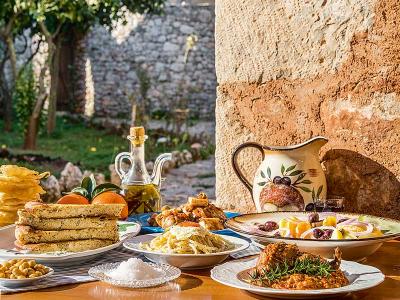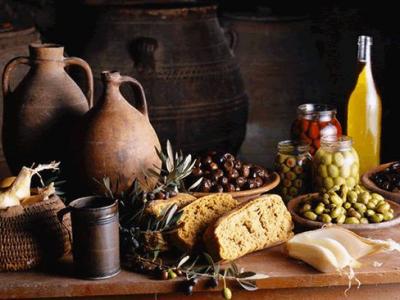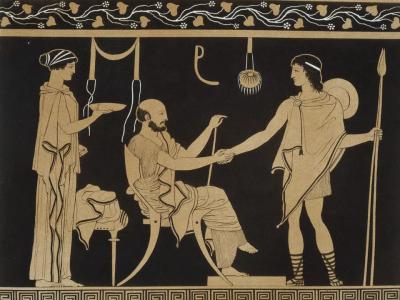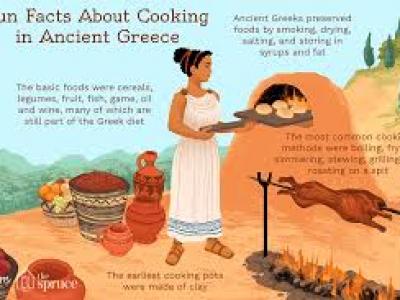Food in Ancient Greece
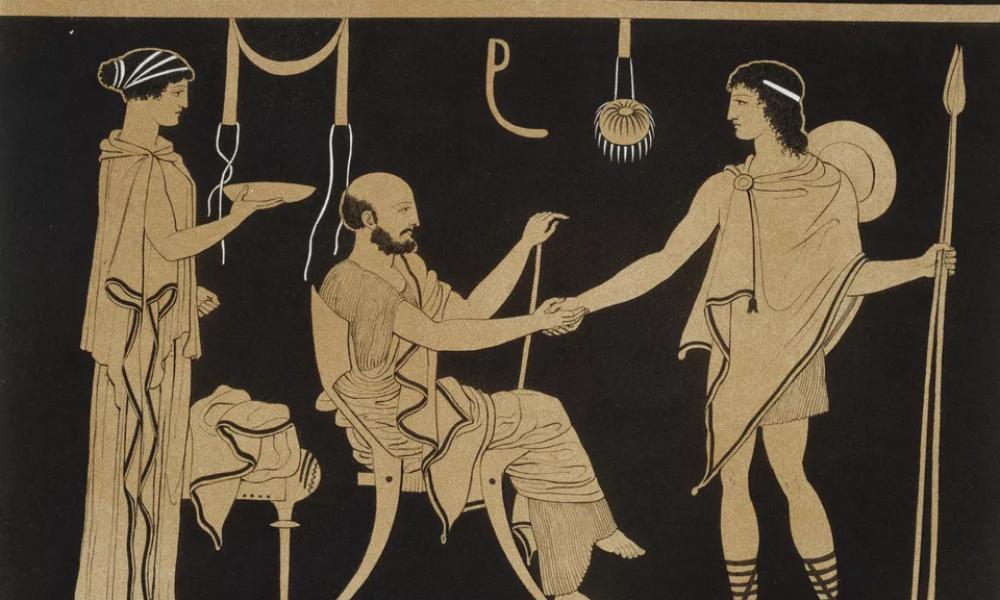
Food History Greek Food
There are many things that have carried on in civilization from the time of the ancient Greeks; they contributed literature, philosophy, democracy, theatre, and the Olympics. But how much of what they ate and how they dined has continued into current-day Greece? Some foods, like pasteli (Greek sesame honey candy), have undoubtedly been around a long time. But unfortunately, historians may never know for sure about ingredients and dishes in ancient Greek food. In terms of their eating style, the ancient Greeks ate as in modern times, with three meals a day. They woke and ate breakfast, they broke from work at midday for lunch, and then they ended the day with dinner and perhaps a little dessert.
Breakfast
The ancient Greeks had the same thing for breakfast—bread dipped in wine. The bread was made from barley, the main source of all bread in ancient times. It was probably hard, which is why the Greeks would dip it in the wine, to soften it up and make it easier to eat. The Greeks also ate something called a teganites (τηγανίτης), which resembles a pancake. These were made with wheat flour, olive oil, honey, and curdled milk, and usually topped with honey or cheese.
Lunch
The Lunch was considered a midday snack, so it was common for the Greeks to dine on relatively light foods like figs, salted fish, cheeses, olives, and more bread.
Dinner
Dinner was and still is the most important meal of the day in Greece. In ancient times, it was when everyone would gather with friends—not family—and discuss things like philosophy or maybe just daily events.
Men and women normally ate separately. In some homes, enslaved people would serve the men dinner first, then the women, then themselves. If the family didn't have enslaved laborers, the women of the house served the men first, and then they ate when the men were finished. Dinner was when most of the foods were consumed. The ancient Greeks would eat eggs from quail and hens, fish, legumes, olives, cheeses, bread, figs, and any vegetables they could grow, which might include arugula, asparagus, cabbage, carrots, and cucumbers. Meats were reserved for the wealthy.
Wine and Water
Besides water, the wine was the main drink of the ancient Greeks. (Fetching the water was a daily task for the women of the house.) The Greeks drank wine at all meals and during the day. They made red, white, rose, and port wines, with the main areas of production being Thasos, Lesbos, and Chios. But the ancient Greeks didn't drink their wine straight—it was considered barbaric to do so. All wine was cut with water. The Greeks drank for the pleasure of the beverage, not with the intention of getting drunk. They also drank kykeon (κυκεών), a combination of barley gruel, water (or wine), herbs, and goat cheese in an almost shake-like consistency.
Dessert
Dessert was a simple enjoyment during ancient Greek times; there weren't elaborate confections as seen today. Raw sugar was unknown to the ancient Greeks, so honey was the main sweetener. Cheeses, figs, or olives drizzled with honey provided a typical ending to an evening meal. The foods of ancient Greece were similar to foods we eat today but did not include many items that have become important parts of modern Greek cooking. For example, tomatoes, peppers, potatoes, and bananas didn't arrive in Greece until after the discovery of the Americas in the 15th century, because that's where those foods originated. Also, lemons, oranges, eggplant, and rice arrived later.
Ancient Greeks enjoyed a varied diet of vegetables, legumes, and fruit as the mainstay. But, being a coastal country with many islands, fish and seafood were an important part of the diet and animal husbandry and hunting brought meats and game to the menu. However, the consumption of fish and meat varied in accordance with the wealth and location of the household.
Typical ancient Greek meals incorporated these food items to varying degrees for breakfast, lunch, and dinner and prepared using different cooking methods to vary the appearance and taste. Ancient Greek cuisine was characterized by its frugality, reflecting agricultural hardship. The ancient Greek diet was founded on the Mediterranean triad of wheat, olive oil, and wine and other foods reflect what was available to ancient Greeks. Several ancient Greek recipes still exist today.
Vegetables
Vegetables were eaten as soups, boiled or mashed, seasoned with olive oil, vinegar, herbs, or garon, a type of fish sauce. And, in the cities, since vegetables were more expensive, the poorer families would consume dried vegetables and oak acorns.
